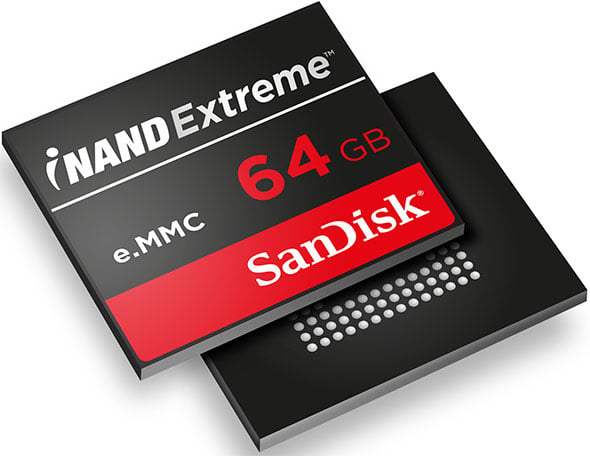SanDisk Targets High End Android Devices with Next Gen iNAND Extreme Embedded Flash
You're going to see a lot of mobile devices announced this week as a result of Mobile World Congress (MWC), but what about the parts inside all those fancy new handsets and tablets? Lest anyone forget about the component side of things, SanDisk today announced the next generation of its iNAND Extreme embedded flash drive (EFD), which it's billing as the fastest, thinnest, and most sophisticated embedded storage product the company has ever built.
SanDisk says its newest 19nm iNAND Extreme will lead to more advanced Android devices. There's a new architecture at work here, one that includes a unique dual-core design with brand new hardware and software data management algorithms. Combined with the latest e.MMC 5.0 specification, SanDisk says its iNAND Extreme offers lower latency and higher bandwidth. What this mean in terms of real-world benefits are devices that multi-task more smoothly and are responsive enough to record or play back 4K video.

"We’ve incorporated our latest memory technology and a truly unique new architecture to create an all new iNAND Extreme," said Drew Henry, senior vice president and general manager, Mobile and Connected Solutions, SanDisk. "iNAND Extreme works with the latest processing technology to reduce latency and take application performance to the next level, from playing 4K video to faster multi-shot, to more responsive gaming apps. iNAND Extreme enables mobile device manufacturers to develop a new generation of faster, more reliable smartphones and tablets that perform exceptionally well."
SanDisk says its embedded flash offers sequential write/read speeds of up to 80/300 MB/s and random write/read speeds of up to 3,000/6,000 IOPS. However, it's not just about raw speed. SanDisk's iNAND Extreme now use a sophisticated error correction mechanism to significantly enhance storage endurance.
As for when we might see devices built around SanDisk's new iNAND Extreme, the company says it's currently sampling 64GB chips to select customers.
SanDisk says its newest 19nm iNAND Extreme will lead to more advanced Android devices. There's a new architecture at work here, one that includes a unique dual-core design with brand new hardware and software data management algorithms. Combined with the latest e.MMC 5.0 specification, SanDisk says its iNAND Extreme offers lower latency and higher bandwidth. What this mean in terms of real-world benefits are devices that multi-task more smoothly and are responsive enough to record or play back 4K video.

"We’ve incorporated our latest memory technology and a truly unique new architecture to create an all new iNAND Extreme," said Drew Henry, senior vice president and general manager, Mobile and Connected Solutions, SanDisk. "iNAND Extreme works with the latest processing technology to reduce latency and take application performance to the next level, from playing 4K video to faster multi-shot, to more responsive gaming apps. iNAND Extreme enables mobile device manufacturers to develop a new generation of faster, more reliable smartphones and tablets that perform exceptionally well."
SanDisk says its embedded flash offers sequential write/read speeds of up to 80/300 MB/s and random write/read speeds of up to 3,000/6,000 IOPS. However, it's not just about raw speed. SanDisk's iNAND Extreme now use a sophisticated error correction mechanism to significantly enhance storage endurance.
As for when we might see devices built around SanDisk's new iNAND Extreme, the company says it's currently sampling 64GB chips to select customers.

